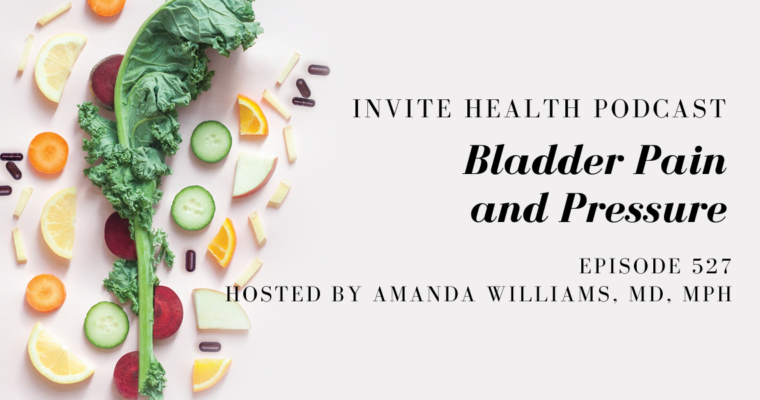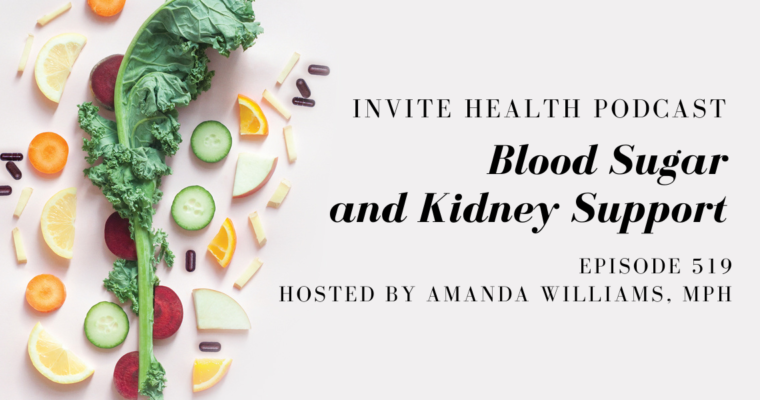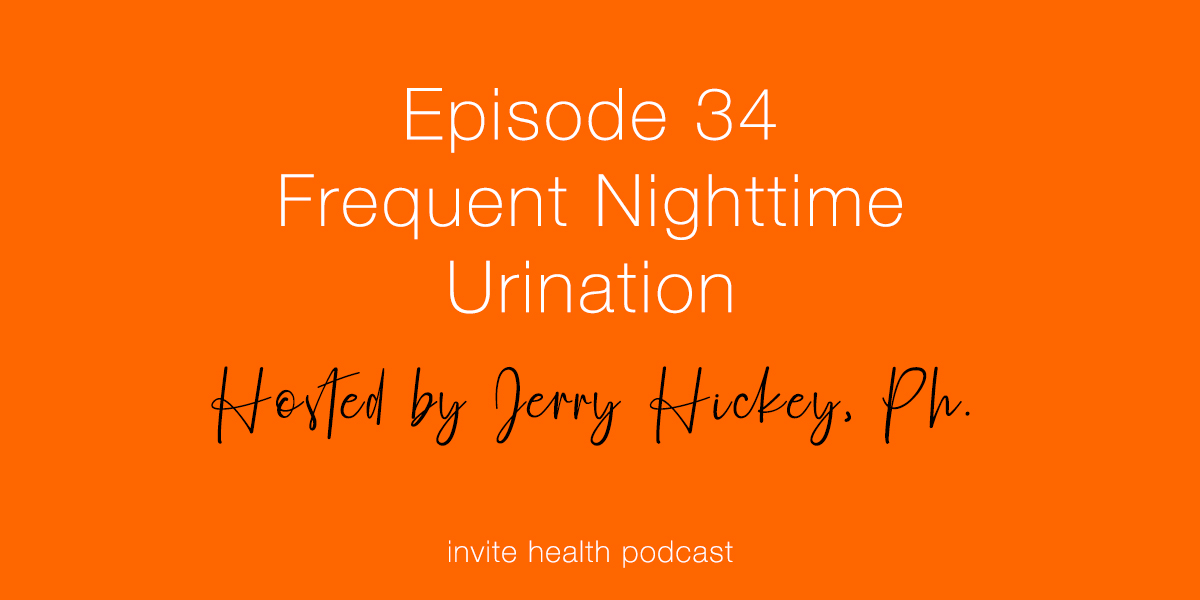Invite Health Podcast, Episode hosted by Jerry Hickey. Ph
Subscribe Today!
Millions of men and women are bothered by multiple trips to the bathroom at night to urinate. This is called Nocturia and it can affect any age group. The estimated incidence of nocturia in the 20 to 45 age group is 11% in men and 18% in women; pretty surprising. Nocturia or nighttime urination issues get more common with age.
48% of men and 53% of women 65 or older develop nighttime urinary frequency. That’s 22% of the US adult population getting up 2 or more times a night to urinate, or about seventy-million adults.
This interrupts sleep which can eventually disrupt your health not to mention you’ll be tired in the morning. What are the causes, and what can you do about it. When it’s chronic and frequent, it’s usually a problem with the urinary tract.
What can cause frequent nighttime urination?
There are three separate conditions that are very common and lead to multiple trips to the bathroom at night to urinate. Many people have two, some men have all three.
In men, it can be the result of a swollen prostate, which can grow larger with age. The prostate gland is in a crowded part of the pelvis and when it enlarges it clamps down on the urethra which is the hose that you urinate out of. This leads to many lower urinary tract symptoms and typically many trips to the bathroom at night.
A second condition is incontinence where the muscles of the bladder are weekend. After menopause women are prone to incontinence and this occurs at about the same time that older men are prone to an enlarged prostate.
The third condition is an overactive bladder. This occurs when the nerves of the bladder improperly fire, thus activating the bladder and the excretion of urine and this happens usually at a totally inappropriate time and place. Overactive bladder caused by an involuntary contraction of the bladder muscle, is more common than diabetes or asthma affecting about 37 million American adults.
More information about your bladder
Your bladder is a muscular sack that is located below your kidneys. Urine from the kidneys flows into the bladder and it is collected and stored there until your next urination. If you didn’t have a bladder, you would dribble liquid all day long.
So what commonly affects the bladder making it leaky? The aging process itself, or diseases such as diabetes, the aftermath of a stroke, or the result of a terribly enlarged prostate can affect the bladder and lead to overactive bladder.
The current male urinary health market focuses solely on the prostate. This is because prostate enlargement, also known as BPH, that leads to multiple trips to the restroom at night to urinate is certainly very common. However, what is less well known is that about 85% of the men with a swollen prostate also have an overactive bladder and to truly get relief men have to try and help both.
Thirty-seven million men and women in the US have an overactive bladder. An additional 59 million American men and women have urinary incontinence and the conservative combined prevalence is over 70 million total. There is an overlap of the two conditions and many individuals have both. This huge number is without including the host of men who solely have a swollen prostate without having an overactive bladder or incontinence.
More information about Incontinence
Incontinence is a loss of bladder control often resulting in some leakage or in more severe cases having to race to the bathroom or you will have an accident – a condition known as urge incontinence or detrusor instability.
Incontinence is extremely common and can affect up to 51 million women and almost 8 million men. Risk factors leading to urine leakage include smoking, obesity, diabetes, and aging itself.
Many younger women experience some mild occasional leakage but it suddenly worsens during menopause. The drop in estrogens weakens the tissues of the bladder and urethra, plus the bladder’s capacity to hold urine shrinks with age so you need to go to the bathroom more frequently.
There are some steps you can take starting today to help with incontinence; watch your liquid intake especially late in the day, regulate how much coffee and alcohol you consume. Reduce your consumption of carbonated drinks, you should probably avoid artificial sweeteners altogether. Keep your spicy and acidic food intake down because these can irritate your bladder and make matter temporarily worse.
Urge incontinence is a more severe scenario. In this situation, the nerves that feed the bladder or line the bladder wall fire at times when they shouldn’t, giving you a sudden extreme urge to run for a bathroom. One way to deal with incontinence is to wear a diaper. Disturbingly, the adult diaper market has almost doubled over the last five years. This is the fastest growing household products business. A second way to deal with incontinence is through a drug prescription. Commonly prescribed incontinence drugs can be downright dangerous and always have side effects. The drugs that treat urinary incontinence are rife with side effects, with many damaging your memory and brain health.
Natural Alternatives for Frequent Urination
There are natural alternatives, and if you combine them with pelvic exercises they can be very helpful.
The first natural and successful support for incontinence I came across many years ago was combining Three Leaf Caper with the Horsetail plant, a natural source of the mineral silica. This combination has been successfully used in human clinical research. The combination worked gently and gradually to help restore bladder control starting in about the first two to three weeks and reaching its best effect generally within 8 weeks. Fifty percent of the study subjects had relief within the first three weeks and it reduced urinary frequency, reduced nocturia, reduced the feeling of urgency, and reduced bladder irritation. It didn’t cause harsh reactions or uncomfortable side effects.
The Three Leaf Caper and Horsetail combo toned and strengthened the bladder muscle and improved confidence with an avoidance of accidents in the daytime. Urinary urgency was reduced, nighttime trips were reduced, the need for adult diapers was reduced and many users had normalized continence after 8 or so weeks. This lead to improved sleep, and people were able to drink as much liquid as they liked.
A second natural combination consisting of concentrated pumpkin seed extract and the antioxidants from soybeans known as isoflavones also improved incontinence and nocturia. In clinical research the combination improved urinary incontinence in women sometimes dramatically within the first six-weeks. Eight-two percent of the women had a good improvement and 37% had a very good improvement. Once again the product was gentle, started to work gradually and was well tolerated.
Just to review, a combination of three leaf caper along with the mineral silica obtained from a plant and in separate research a combination of pumpkin seed along with isoflavones from soy legumes both individually helped improve incontinence and overactive bladder while decreasing the number of trips to urinate at night.
I can tell you from my many decades of experience that when I recommend a combination of the two mixtures, they safely and fairly quickly help improve the symptoms of urinary incontinence and overactive bladder in both men and women. They can even help improve the life of men with a swollen prostate.
In a future episodes I will discuss an enlarged prostate and also the drugs and supplements used for relief; are they helpful, are they safe. And very soon I will also devote an episode to prostate cancer.
Thank you for tuning in to the Invite Health Podcast. You can find all of our episodes for free wherever you listen to podcasts or by visiting www.invitehealth.com/podcast. Make sure you subscribe and leave us a review! Follow us on Facebook, Twitter and Instagram at Invite Health today. We’ll see you next time on another episode of the Invite Health Podcast.




